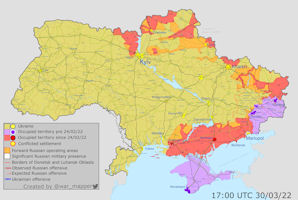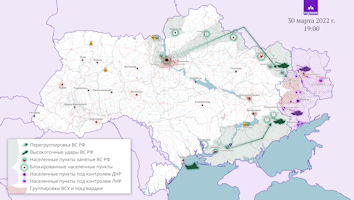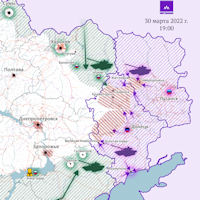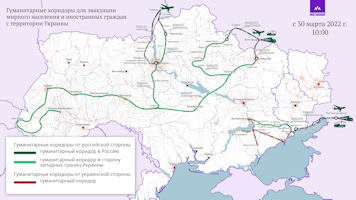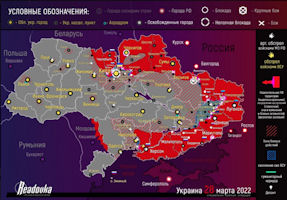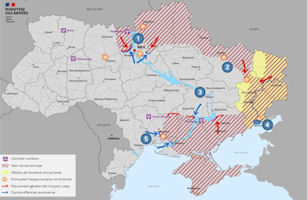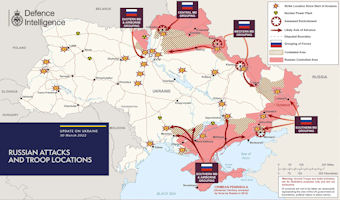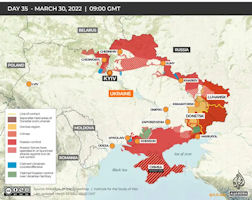Russo-Ukraine War - 30 March 2022
| Su | M | Tu | W | Th | F | Sa |
|---|---|---|---|---|---|---|
| 1 | 2 | 3 | 4 | 5 | ||
| 6 | 7 | 8 | 9 | 10 | 11 | 12 |
| 13 | 14 | 15 | 16 | 17 | 18 | 19 |
| 20 | 21 | 22 | 23 | 24 | 25 | 26 |
| 27 | 28 | 29 | 30 | 31 |
On 24 February 2022, Ukraine was suddenly and deliberately attacked by land, naval and air forces of Russia, igniting the largest European war since the Great Patriotic War. The military buildup in preceeding months makes it obvious that the unprovoked and dastardly Russian attack was deliberately planned long in advance. During the intervening time, the Russian government had deliberately sought to deceive the world by false statements and expressions of hope for continued peace.
"To initiate a war of aggression... is not only an international crime; it is the supreme international crime differing only from other war crimes in that it contains within itself the accumulated evil of the whole." [Judgment of the International Military Tribunal]
Russian President Vladimir Putin announced a "special military operation" in Ukraine in response to the appeal of the leaders of the "Donbass republics" for help. That attack is a blatant violation of the territorial integrity, sovereignty and independence of Ukraine. Putin stressed that Moscow's goal is the demilitarization and denazification of the country.
Putin is being misled by advisers, a US official told Reuters, citing declassified intelligence. “We believe that Putin is being misinformed by his advisers about how badly the Russian military is performing and how the Russian economy is being crippled by sanctions, because his senior advisers are too afraid to tell him the truth,” the official said. “Putin didn’t even know his military was using and losing conscripts in Ukraine, showing a clear breakdown in the flow of accurate information to the Russian president,” the official said.
According to VTsIOM, the share of Russian residents who support the decision to conduct a special military operation of Russia in Ukraine increased by 11% over the month - from 65% to 76%.
After talks in Istanbul, Russia promised to scale down military operations around Kyiv and the northeastern city of Chernihiv. Vladimir Medinsky, head of the Russian negotiating team, says “this is not a ceasefire but this is our aspiration, gradually to reach a de-escalation of the conflict at least on these fronts”.
The planned regrouping of Russian troops is taking place in the Kiev and Chernigov directions, said the official representative of the Russian Ministry of Defense, Major General Igor Konashenkov. According to him, there was a plan to tie up the Armed Forces of Ukraine on the battlefield and without storming cities, in order to avoid losses among the civilian population, to inflict such a defeat on the armed formations of Kyiv that would not allow him to use these forces in the main direction of the Russian Armed Forces - in the Donbass. "All these goals were achieved," the general stressed.
Ukrainian President Volodymyr Zelenskyy said there is no reason to believe Russia’s announcement given what is happening on the ground. Zelenskyy described the signals from peace talks with Russia as positive, but he expressed caution about Moscow’s promise to sharply curtail military action in some areas. “We can say the signals we are receiving from the talks are positive but they do not drown out the explosions of Russian shells,” he said, adding that Ukraine could only trust a concrete result from the talks. “The Russian army still has significant potential to continue attacks against our state,” he said. “Therefore we are not reducing our defensive efforts.”
“Of course, we see all the risks. Of course, we see no reason to trust the words of certain representatives of a state that continues to fight for our destruction,” he said. “Ukrainians are not naïve people. Ukrainians have already learned during these 34 days of invasion and over the past eight years of the war in Donbas that only a concrete result can be trusted.”
Ukraine’s military said it distrusts Russia’s announced withdrawal from around Kyiv and Chernihiv. “There are indications that the Russian forces are regrouping to focus their efforts on eastern Ukraine,” the Ukrainian general staff said in a statement. “At the same time, the so-called ‘withdrawal of troops’ is most likely a rotation of individual units and is aimed at misleading the Ukrainian military leadership” by creating the misconception that the Russians have decided not to try to encircle Kyiv, it said.
The US and the UK also expressed scepticism. “I don’t read anything into it until I see what their actions are,” US President Biden said. Russian units suffering heavy losses had to return to Belarus and Russia to reorganise and resupply, British military intelligence said. Separately, residential areas of Ukraine’s eastern city of Lysychansk have been shelled by heavy artillery, the regional governor said. The Pentagon said it had seen some Russian troops in the areas around Kyiv moving north toward or into Belarus over the last 24 hours. Pentagon press secretary John Kirby said the US does not view this as a withdrawal, but as an attempt by Russia to resupply, refit and then reposition the troops.
The British Ministry of Defence says Russian setbacks and Ukrainian counterattacks around Kyiv mean “it is almost certain” that Russia “has failed in its objective to encircle” the capital city. In its latest intelligence update, the ministry said Russian pledges to cut back troops around Kyiv may indicate its “acceptance that it has now lost the initiative in the region”. “It is highly likely that Russia will seek to divert combat power from the north to their offensive in the Donetsk and Luhansk regions in the east,” the ministry added.
The West should step up sanctions pressure on Russia until its troops leave Ukraine, British Prime Minister Boris Johnson said. “I definitely don’t think that the G7 should be expected to lift sanctions on Russia if Ukraine simply imposes a ceasefire. This will only play into the hands of [Russian President Vladimir] Putin. From my point of view, we should systematically increase sanctions until the last Russian soldier leaves Ukraine," said Johnson, whose speech was broadcast on parliamentary television. Asked if it was also about Crimea, Johnson reiterated that "all Russian soldiers must leave Ukraine."
French Foreign Minister Jean-Yves Le Drian said he sees no progress in the negotiations between Russia and Ukraine. "The positions [of the parties] have remained stable," the French minister said. "We should not be under illusions about the statements made, we need real action," Le Drian also argued.
The prevailing wisdom among Ukraine’s leaders was that Russia is “not making a retreat of any kind”, but its forces are instead “regrouping”. They continue to say that you cannot trust what Russia says, but that you have to see what they do and watch their actions on the ground. And what was seen was more attacks in the west of the country overnight – fuel depots were hit, and the Russian ministry of defence has said that is to hinder the resupply of Ukrainian forces fighting in the Donbas region.
Russia is moving forces from northern to eastern Ukraine to try to encircle Ukrainian troops, but is keeping some behind near the capital Kyiv to tie down part of the Ukrainian military there, an adviser to Zelenskyy said. “Although the Russians are withdrawing some troops from [around] Kyiv, they will still leave certain forces here [near Kyiv] to keep our troops here,” Oleksiy Arestovych said in televised comments.
The governor of Ukraine’s northern Chernihiv region says there has been no let-up in Russian attacks despite a promise by Moscow to scale down military operations there. “Do we believe in it [the promise]? Of course not,” Governor Viacheslav Chaus said on Telegram. “The ‘decreased activity’ in the Chernihiv region was demonstrated by the enemy carrying out strikes on (the city of) Nizhyn, including air strikes, and all night long they hit [the city of] Chernihiv.”
Russia's position in negotiations with Ukraine is well known, and it has not changed. This was announced by the press secretary of the President of Russia Dmitry Peskov. The Russian side notes positive developments following the results of negotiations with Ukrainian representatives in Istanbul, but there are no serious breakthroughs, and there is still a long way to go. He called the transition of the Ukrainian side to specific formulations and proposals a positive factor. “For the rest, so far, let’s say, we cannot state anything very promising, some breakthroughs, there is still a very, very long work ahead,” the Kremlin spokesman said. “Crimea is part of the Russian Federation, and according to our constitution, we cannot discuss with anyone the fate of the territories of the Russian Federation, the fate of Russian regions, this is out of the question, this is written in our Constitution ,” Peskov said.
Moscow’s lead negotiator in talks with Ukraine said that Kyiv’s readiness to consider a neutral status would meet a key Russian demand. Vladimir Medinsky said in televised comments that Ukrainian officials had submitted a set of proposals including Kyiv’s readiness to adopt a non-bloc, nuclear-free status and drop its bid to join NATO. He added Ukraine had also signalled its readiness not to host foreign military bases and to hold joint drills with foreign militaries only in consultation with countries serving as guarantors of a peace deal, which would include Russia. Medinsky said the proposals signalled Ukraine’s readiness to reach agreement “for the first time in years”, adding that “if it fulfils the obligations, the threat of creating a NATO bridgehead on the Ukrainian territory will be removed.”
It is impossible to believe that Ukraine will follow the agreements reached at the talks. This was stated on March 30 by military expert Igor Korotchenko on the air of the 60 Minutes program on the Russia 1 TV channel. According to him, the key to the formation of normal political processes in Ukraine is not at the negotiating table, but on the battlefield. Therefore, Russia must continue the special operation. Ukraine will become more and more negotiable as Russia gains new successes in the course of the special operation. According to Korotchenko, in no case should Russia make concessions and give up at least part of its initial demands, including the denationalization and demilitarization of Ukraine.
NATO Secretary General Jens Stoltenberg urged restraint in evaluating the results of the negotiations between the Russian and Ukrainian delegations in Istanbul. “Let's be careful in assessing some of the positions taken, ” Stoltenberg said in an interview with the French edition of Le Monde, commenting on the issue of Russia's desire to concentrate its efforts on the Donbass. He believes that the Russian Federation underestimated the possibilities of Ukrainian resistance, overestimating its own forces. “This explains its obligation to revise its plans in accordance with the development of the conflict,” the Secretary General added.
After completing the tasks of the first stage of the military operation in the Kiev and Chernihiv directions, a planned regrouping of troops is being carried out, the official representative of the Russian Defense Ministry, Major General Igor Konashenkov , said on March 30 at a briefing. He explained that the tasks of the first stage did not include the assault on large cities in northern Ukraine.
US President Joe Biden, while criticizing Russian President Vladimir Putin , did not make a slip of the tongue, but revealed the plans of the White House. Tulsi Gabbard, former US presidential candidate and former member of the House of Representatives from the District of Hawaii, said this on Fox News. “President Biden just said out loud the goals of his administration, which is to change power in Russia, to remove Putin from power, ” Gabbard said.
Prime Minister Boris Johnson says Britain is not aiming to remove Russian President Vladimir Putin, after comments by US President Joe Biden ignited a debate on the future of Moscow’s leader. “To desire a change of government in itself is not an ignoble thing … that’s the objective of a lot of democratic politics,” Johnson said. “But let’s be absolutely clear, it’s not the objective of the UK government, and it’s very, very important that everybody gets this. We are simply setting out to help to protect the people of Ukraine, and to protect them against absolutely barbaric and unreasonable violence.”
The Ministry of Defense of the Russian Federation reported that high-precision air-launched missiles destroyed large fuel depots in the Starokonstantinov and Khmelnitsky regions, from which fuel was supplied for the armored vehicles of the Ukrainian troops in the Donbass; Iskanders destroyed two large depots of rocket and artillery weapons in Kamenka in the Donetsk region; Near Tumen in the Rivne region near the Ukrainian-Belarusian border, a Su-24 of the Ukrainian Air Force was shot down during an air battle; Russian air defense destroyed 10 Ukrainian drones in the areas of Izyum, Nova Kakhovka, Donetsk, Nikolaev, Berdyansk, Horlivka, Luhansk and Rubizhne in a day.
Another 64 Ukrainian military facilities were destroyed during a special military operation by the Russian Armed Forces, Major General Igor Konashenkov , spokesman for the Russian Defense Ministry, said during a briefing on March 30. Russian forces have destroyed large depots of fuel and rocket and artillery weapons in the Khmelnytsky and Donetsk regions of Ukraine with missile strikes. Large fuel depots were located near the cities of Starokonstantinov and Khmelnitsky. Two large warehouses of rocket and artillery weapons were located in the village of Kamenka in the Donetsk region. He specified that over the past day, operational-tactical aviation and missile forces hit four command posts, three anti-aircraft missile systems, three multiple rocket launchers, two artillery batteries and 49 areas of concentration of Ukrainian military equipment and strongholds of the Armed Forces of Ukraine. In total, since the beginning of the operation, 124 Ukrainian aircraft and 77 helicopters, 214 anti-aircraft missile systems, 321 drones, 1,752 tanks and other combat armored vehicles, 184 multiple rocket launchers, 734 guns have been destroyed. During the past day, Russian aviation destroyed three anti-aircraft missile systems - one S-300 and two Buk-M1.
Unmanned and tactical aircraft of the Russian Armed Forces hit 69 military targets of Ukrainian Nazis in a day, Major General Igor Konashenkov said at a briefing on March 30. In addition, two Ukrainian unmanned aerial vehicles shot down in the areas of the settlements of Balakleya and Verkhnetoretskoe were destroyed by air defense means during the day.
The advancing grouping of troops of the Luhansk People's Republic continues to move towards Severodonetsk Major General Igor Konashenkov, said at a briefing on March 30 . “Units of the Lugansk People's Republic continue their offensive against Severodonetsk. Fighting is underway to clean up the settlement of Zhitlovka.” The offensive operation in the Donbass is intensifying in several directions at once, the head of the DPR Denis Pushilin said on March 30 on Channel One. According to him, the sooner the territory of the republic is liberated, the less victims and destruction there will be.
The liberation of the Donetsk People's Republic (DPR) is proceeding faster than at the beginning of the special operation, although it is still impossible to talk about the timing of its completion. The head of the DPR , Denis Pushilin, stated this on March 30 on the air of the Rossiya 1 TV channel. “Everything is connected with many factors, but the fact that the operation is accelerating is already a fact ,” Pushilin emphasized. In the Donetsk People's Republic, 55-60% of the republic's territory has been liberated from occupation.
In Mariupol, Russian occupiers deliberately target building of the International Red Cross, marked by a red cross, with artillery and aviation bombs, Azov regiment said. A spokeswoman for the Red Cross in Geneva confirmed to AFP that the image shown showed an ICRC warehouse in Mariupol. "We don't have a team on the ground so we don't have any other information, including casualties or potential damage," she said. According to this spokesperson, all the humanitarian aid stored in the building had already been distributed.
Ukraine’s UN ambassador Sergiy Kyslytsya has told the UN Security Council that the “demilitarisation of Russia is well under way” due to “unprecedented” personnel and equipment losses. Since the beginning of the invasion into Ukraine, Kyslytsya said the Russian occupiers have lost more than 17,000 military personnel, at least 1,700 armored vehicles and almost 600 tanks. He also said Russia also has lost 300 artillery systems, 127 planes and 129 helicopters, almost 100 rocket launchers systems, 54 air defence systems and seven ships. Kyslytsya said that is “an unprecedented blow to Moscow, where the numbers of Soviet losses in Afghanistan pale in comparison”.
Ukraine appeared to have conducted a missile strike on a suspected munitions depot 12 miles across the border in Russia. Footage shared overnight on social media showed a series of large explosions in the vicinity of Belgorod, western Russia. The Ukrainian defence ministry denied responsibility for the missile attack and accused Russian troops of accidentally triggering an explosion by failing to store their munitions safely. Russian officials said that six missiles had hit the depot in Krasny Oktyabr, a town southeast of Belgorod. They said that there had been no casualties, although Russian media reported that four soldiers had been injured.
The head of the National Center for Defense Control of the Russian Federation, Colonel-General Mikhail Mizintsev stated that the Ukrainian military who surrendered said that the national battalions of Ukraine were ordered to prepare staged videos about the massacres of civilians allegedly by Russian military personnel, became a reason for discussion on the Internet. Citizens expressed their opinion on this on March 30 on the VKontakte social network.
Currently, only scattered groups of "Ukrainian Nazi battalions" can move around certain areas of Mariupol and the city is being cleaned from them. On March 30, the head of the Donetsk People's Republic (DPR) Denis Pushilin spoke about this on the air of the Rossiya 1 TV channel. The forces of the NM DPR, with the support of the RF Armed Forces, continue offensive operations in the city of Mariupol. With the support of technology, advanced detachments of the marines and other units are "coherently and professionally cleaning up the city" from Ukrainian militants and nationalists.
Thousands of civilians may have died in the besieged port city of Mariupol in southern Ukraine since bombing began four weeks ago, a UN official said. “We do think that there could be thousands of deaths, of civilian casualties, in Mariupol,” Matilda Bogner, head of the UN human rights mission in Ukraine, said.
Unification with Russia is the strategic goal of South Ossetia. This is stated in the address of the President of the Republic Anatoly Bibilov dated 30 March 2022. Stating that South Ossetia, Russia and the whole world are experiencing a turning point today, the head of the republic noted that the Russians defend the interests of those "who oppose Nazism", Russia " respects universal human values and fundamental rights and norms accepted by the entire international community." In 2008, Bibilov notes, the first "revival of the Russian world" in recent history took place . There was an understanding that "there is a line that cannot be crossed." Then Moscow decided to protect the Ossetian people and recognize the independence of South Ossetia. This Russian decision "gave the people of South Ossetia guarantees of peace and opportunities for development."
Russian hackers have recently attempted to penetrate the networks of NATO and the militaries of some eastern European countries, Google’s Threat Analysis Group has said in a report. The attack was launched by a Russian-based group called Coldriver, or Callisto, and used what Google described as “credential phishing campaigns.” The report said “These campaigns were sent using newly created Gmail accounts to non-Google accounts, so the success rate of these campaigns is unknown”.
A cyberattack targeting a satellite network used by Ukraine’s government and military agencies also knocked offline tens of thousands of broadband internet users across Europe, the satellite owner has disclosed. US-based Viasat provided new details of how the cyberattack affected users from Poland to France and knocked off remote access to thousands of wind turbines in central Europe.
German military-industrial enterprises can sell Ukraine additional batches of weapons and military equipment for a total of €300 million, the Süddeutsche Zeitung newspaper reports on March 30. According to the publication, the decision on deliveries will be made by a special committee under the German Ministry of Defense, including equipment and weapons that are not listed for the Bundeswehr, and the Kiev authorities can now carry out orders from German enterprises themselves.
Ukrainian President Volodymyr Zelensky asked the Norwegian parliament for various weapons systems, including Harpoon anti-ship missiles and NASAMS air defense missile systems. The Ukrainian President stated this on March 30 during a video address to the Norwegian Parliament. Norway will give Ukraine anti-tank weapons M72. This decision was made by the government of the country. This was announced by Prime Minister Jonas Gahr Stere.
Zelensky asked Norway to provide Kiev with weapons, in particular, Harpoon anti-ship missiles and NASAMS mobile anti-aircraft missile systems. "I want to clearly state what we need. In particular, anti-ship weapons - Harpoon missiles, as well as NASAMS anti-aircraft systems. In addition, we need weapons to destroy armored vehicles, artillery systems. All weapons that you can help us with will be used only for protection," he said in a video message to the Norwegian Parliament. The German government said it has received assurances from Russia that European companies won’t have to pay for Russian gas supplies in rubles. German Chancellor Olaf Scholz’s office said Putin had stressed during a phone conversation that there would be no change for European contractual partners, who would continue to pay only in euros to Gazprom Bank. However, Scholz’s office also reported Putin as saying that he planned to issue a law requiring gas supplies to be paid in rubles from April 1.
The executive director of the World Food Program (WFP) warned that the crisis in Ukraine, a major food producer, will have disastrous humanitarian consequences around the world, especially in places already suffering from food shortages, like Yemen and the Horn of Africa. David Beasley said the world was already grappling with increased food and transportation prices – issues that will get worse as Ukraine goes from being “the breadbasket of the world” to being on “the breadline”.
Russia is “purposefully” trying to destroy Ukraine’s agriculture infrastructure in order to disrupt the country’s sowing campaign and create a global food crisis, Ukraine’s UNIAN news agency quoted a government minister as saying. “Russia doesn’t want us to sow the agriculture lands we have in the areas we control,” Oleh Nemchinov, minister of the cabinet of ministers, was quoted as saying. “It’s no secret to anyone that the strikes on oil depots that Russia has carried out over the past few days are, in fact, strikes on the sowing field,” he added. Nemchinov went on to accuse Moscow of wanting to manufacture a “humanitarian catastrophe” in North Africa and the Middle East, as well as the other parts of the world to which Ukraine exports grain, in order to create a “point of geopolitical confrontation”.
Nikolay Mitrokhin, a Russia expert and researcher at Germany’s Bremen University, says Russian forces have not been able to “cancel the sowing season in Ukraine” despite alleged attacks on the country’s agricultural infrastructure. “Even if they burn down all large fuel storages – the farmers mostly bought the fuel in the fall and have it in tanks by their side,” Mitrokhin told Al Jazeera. But he added that there is an issue with the export of the remaining wheat from last year’s harvest because the Black and Azov seas are being blockaded by the Russian navy – a situation that is contributing to the panic on the global food market.
The UN’s refugee agency (UNHCR) says more than four million refugees have now fled Ukraine since Russia launched its war on February 24. Of those, 2.3 million have entered neighbouring Poland. An estimated 6.5 million people have also been displaced from their homes within Ukraine.
Over 2 million refugee children left Ukraine after the start of the Russian military operation in Ukraine, the United Nations Children's Fund (UNICEF) said in a statement. According to the organization, another 2.5 million children within the country were forced to leave their homes. Children make up half of all Ukrainian refugees.
|
NEWSLETTER
|
| Join the GlobalSecurity.org mailing list |
|
|
|


